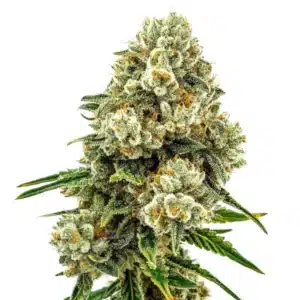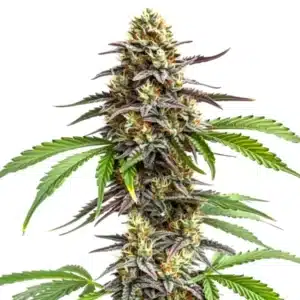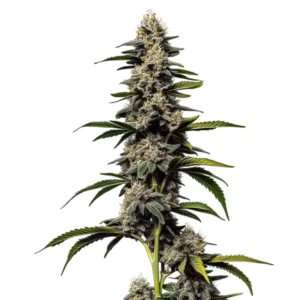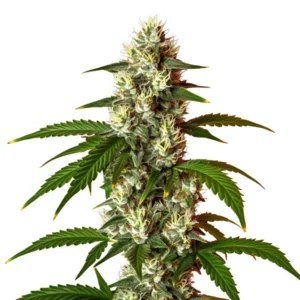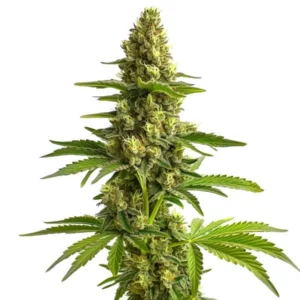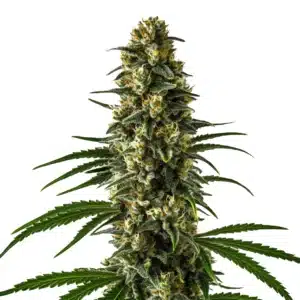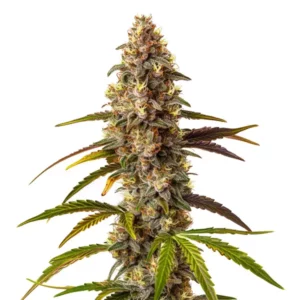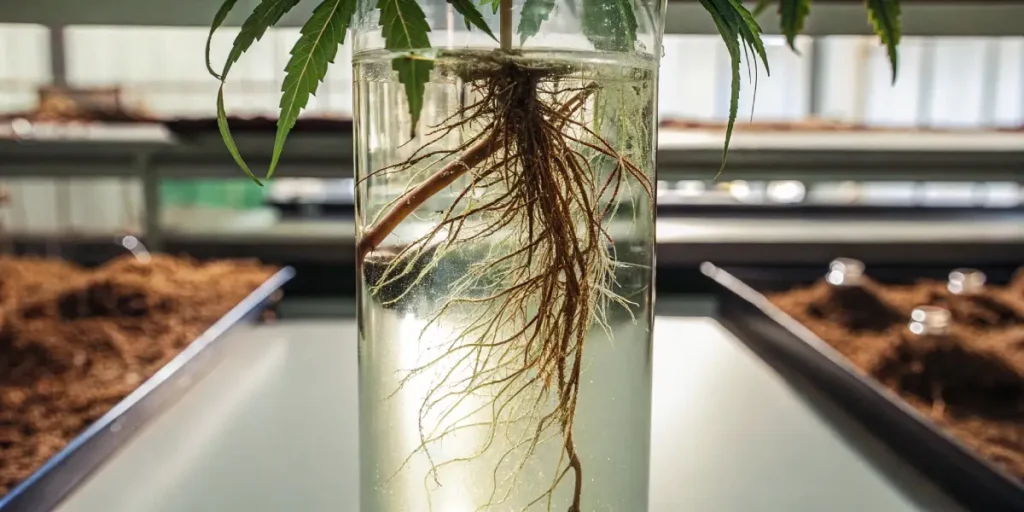
What Are Cannabis Root Exudates
Cannabis root exudates are a fascinating aspect of plant biology that every grower should know about. These exudates are compounds secreted by the roots of cannabis plants. They’re like little chemical messengers that interact with the soil and the ecosystem surrounding the plant roots.
The chemical composition of the compounds released by cannabis roots includes sugars, amino acids, and organic acids. These substances play a crucial role in plant-microbe interactions. When roots release these compounds, they attract beneficial microbes that help improve soil health and plant growth.
Recommended Strains
Acid Diesel
|
|
THC | 18% - 20% (Medium) |
|
|
Type | Feminized |
|
|
Yield | Low |
|
|
Phenotype | 60% Indica / 40% Sativa |
Afghan Kush
|
|
THC | 16% - 21% (Medium) |
|
|
Type | Feminized |
|
|
Yield | Medium |
|
|
Phenotype | 90% Indica / 10% Sativa |
For those growing Blimburn Seeds’ Bruce Banner 3, knowing what cannabis root exudates are can enhance your cultivation practices. These exudates can affect everything from nutrient uptake to disease resistance, making them an essential topic for both novice and experienced growers.
Benefits of Cannabis Root Exudates
One of the major benefits of cannabis root exudates is their impact on soil health. These compounds help in building a rich and diverse soil ecosystem. By promoting the growth of beneficial bacteria and fungi, root exudates improve the soil’s nutrient content.
Another benefit is how these exudates affect plant growth. They help the plant absorb nutrients more efficiently, leading to healthier and more robust cannabis plants. For instance, growers of Blimburn Seeds’ GG4 can see enhanced growth by considering the function of these exudates in their growing practices.
Besides, the benefits of natural root secretions extend to improving the overall resilience of plants. By fostering a balanced microbial community in the soil, these compounds contribute to a more stable and robust growing environment. This means that plants are better equipped to withstand environmental stresses and pest pressures.
Moreover, knowing the function of root secretions can also lead to more sustainable cultivation practices. By naturally enhancing the soil ecosystem, growers can reduce their reliance on synthetic fertilizers and pesticides, promoting a more eco-friendly approach to cannabis cultivation.

Promos & Deals
Cannabis Root Exudates and Soil Health
Soil health is a crucial factor for successful cannabis cultivation. Cannabis root exudates contribute to this by encouraging the growth of beneficial microbes. These microbes help break down organic matter, making nutrients more accessible to the plant.
Healthy soil leads to healthier plants, and the compounds released by roots are key to maintaining this balance. They also help in suppressing harmful pathogens in the soil. This means fewer diseases and a stronger plant overall.
The interaction between root secretions and soil health is a dynamic process. As these compounds are released, they change the soil’s pH and nutrient profile, creating a more favorable environment for plant growth. This ongoing interaction helps sustain a thriving soil ecosystem that benefits the entire plant.
Furthermore, root secretions play a role in the development of soil structure. They contribute to the formation of soil aggregates, which improve aeration, water retention, and root penetration. This structural enhancement is vital for optimizing plant health and maximizing yields.
How Cannabis Root Exudates Affect Plant Growth
The impact of cannabis root exudates on plant growth is profound. These compounds help in the uptake of water and nutrients, which are essential for plant development. They also improve root architecture, allowing plants to explore a larger volume of soil.
By enhancing nutrient absorption, certain natural compounds promote faster and more vigorous growth. This is especially important for growers aiming for high yields. The right balance of these substances can lead to a noticeable difference in plant size and health.
Additionally, their impact on plant growth can be observed in the way they influence root branching and elongation. By promoting a more extensive root network, they enable plants to access a wider range of soil resources, thus supporting overall plant vigor.
Moreover, their role in enhancing stress tolerance should not be overlooked. These compounds help plants cope with various stressors, such as drought or nutrient deficiency, by triggering adaptive responses that enable the plant to maintain growth and productivity.
Cannabis Root Exudates Chemical Composition
The chemical composition of cannabis root exudates is diverse. It includes simple sugars like glucose and fructose, which serve as food for beneficial microbes. These sugars are crucial for establishing a symbiotic relationship between the plant and the soil organisms.
Amino acids and organic acids are also part of the mix. These compounds help in various plant functions, from nutrient uptake to stress response. Knowing this chemical composition can help growers optimize their soil conditions and improve plant health.
Besides sugars and acids, the chemical composition of root exudates may include secondary metabolites like flavonoids and terpenoids. These compounds can enhance plant defense mechanisms and contribute to the aromatic profile of the plant.
Knowing the intricacies of root exudate composition allows growers to tailor their soil amendments and cultivation techniques. By doing so, they can create an environment that maximizes the beneficial interactions between roots and soil organisms, leading to healthier plants and better yields.
Role of Cannabis Root Exudates in Plant-Microbe Interactions
Plant-microbe interactions are a fundamental aspect of healthy plant growth. Cannabis root exudates play a significant role in these interactions. By attracting beneficial microbes, they create a supportive environment for the plant.
These microbes, in turn, help in nutrient cycling and disease suppression. This symbiotic relationship ensures that the plant has access to all necessary resources for growth. It’s like having a team of helpers working for the plant’s benefit.
The function of plant secretions in plant-microbe interactions is also evident in their ability to enhance mycorrhizal associations. Mycorrhizae are fungi that form symbiotic relationships with plant roots, further aiding in nutrient uptake and plant health.
Furthermore, these secretions can lead to the development of biofilms around the roots. These biofilms act as protective barriers, shielding the plant from harmful pathogens while facilitating beneficial microbial activity.
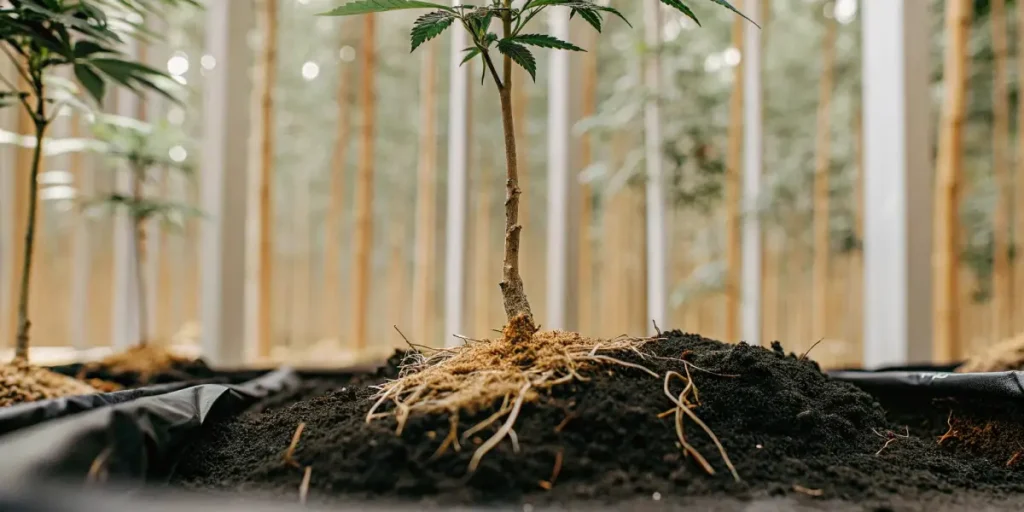
FAQs
What are cannabis root exudates?
Cannabis root exudates are chemical compounds secreted by the roots of cannabis plants. They include sugars, amino acids, and organic acids, which play a crucial role in plant and soil health. These exudates interact with the soil environment, influencing nutrient uptake and microbial activity.
Knowing how root secretions work can help growers optimize their cultivation practices. They affect everything from soil health to plant growth, making them an essential aspect of successful cannabis cultivation.
Additionally, knowing these underground emissions can guide growers in selecting appropriate soil amendments and microbial inoculants. By enhancing the natural processes facilitated by them, growers can achieve more sustainable and productive cultivation systems.
Moreover, as research on these biological interactions continues to evolve, growers can stay informed about new findings and insights. This knowledge can lead to innovative cultivation strategies that harness their full potential for improved plant health and yield.
What are the benefits of cannabis root exudates?
The benefits of cannabis root exudates are numerous. They improve soil health by promoting the growth of beneficial microbes and enhancing nutrient availability. This leads to healthier and more robust cannabis plants.
Additionally, these exudates help in disease suppression and improve plant resilience. By fostering a balanced soil ecosystem, root exudates contribute to higher yields and better-quality cannabis.
Furthermore, the plant’s natural exudates contribute to environmental sustainability. By reducing the need for chemical inputs, they support organic and regenerative farming practices, ultimately benefiting the broader ecosystem.
In the context of integrated pest management, these natural compounds help attract beneficial insects and predators. This natural pest control mechanism can reduce the incidence of pest-related damage and improve crop quality.
How do cannabis root exudates affect plant growth?
Cannabis root exudates significantly impact plant growth by enhancing nutrient absorption and water uptake. They improve root architecture, allowing plants to access more soil resources. This results in faster and more vigorous growth.
By promoting a healthy microbial community, these exudates also help in disease suppression and stress response. This makes plants more resilient and capable of reaching their full growth potential.
Besides enhancing growth, the influence of root secretions on plant development can be seen in their effect on flowering and fruiting stages. By optimizing nutrient availability, these compounds support robust bud development and improved cannabinoid production.
Moreover, the impact of these root interactions on plant growth can lead to increased secondary metabolite production. These compounds contribute to the plant’s aroma and therapeutic properties, adding value to the final product.
What is the chemical composition of cannabis root exudates?
The chemical composition of cannabis root exudates is diverse, including sugars, amino acids, and organic acids. These compounds serve various functions, from feeding beneficial microbes to improving nutrient uptake.
Knowing this composition can help growers optimize soil conditions and enhance plant health. By fostering a rich and balanced soil ecosystem, the benefits of root exudates can be maximized.
Additionally, the chemical composition of root exudates may vary with plant age, environmental conditions, and soil type. These variations can influence the interactions between roots and soil microbes, affecting overall plant performance.
Research into the composition of these exudates is ongoing, with new discoveries shedding light on their complex roles. This evolving knowledge can inform breeding programs and cultivation practices aimed at optimizing exudate production for improved plant health.
What is the function of cannabis root exudates in plant-microbe interactions?
Cannabis root exudates play a crucial role in plant-microbe interactions by attracting beneficial microbes to the root zone. These microbes help in nutrient cycling, disease suppression, and overall plant health.
By establishing a symbiotic relationship with these microbes, cannabis plants can access more resources and enhance their resilience. This interaction is key to achieving successful cultivation and maximizing yields.
The interaction between cannabis roots and microbes is also linked to the modulation of soil enzyme activities. These enzymes facilitate organic matter decomposition, releasing essential nutrients that are readily available for plant uptake.
Moreover, these root-microbe interactions can influence the genetic expression of both plants and microbes. This genetic modulation can lead to enhanced stress tolerance and adaptive responses, supporting plant health and productivity.


